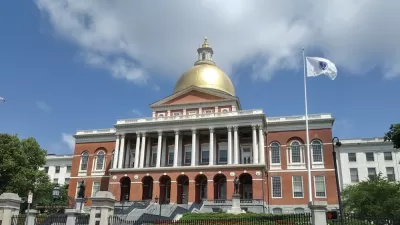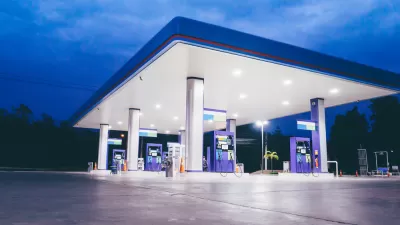The Democratic House just passed a gas tax increase that the Republican governor opposes because he wants his state to join the Transportation and Climate Initiative, a carbon pricing program applicable to fuel. Both measures will fund transit.

Complex politics are playing out in the Bay State between the Democratically-controlled legislature and Gov. Charlie Baker, a Republican who endorses a carbon pricing program being advanced by the 12-state plus District of Columbia collaborative known as the Transportation & Climate Initiative (TCI).
"The Massachusetts House of Representatives approved a major tax bill Wednesday [March 4] night that Democratic leaders say will generate more than half a billion dollars for transportation infrastructure by increasing taxes or fees on gasoline, corporations, ride-hailing services, and vehicle purchases by rental car companies," reports Chris Lisinski of State House News Service.
House Speaker Robert DeLeo and other elected officials had pledged since last year that they would take action to raise new revenue for transportation, hoping to revitalize the aging and unreliable MBTA system, inject more money into road maintenance, and offer greater support to regional transit authorities.
Under the bill (H 4508), which Democratic leaders project will bring in $522 million to $612 million per year, the state’s 24-cents-per-gallon gasoline and diesel taxes [pdf[] would increase by 5 cents and 9 cents, respectively.
Gas taxes vs. the Transportation & Climate Initiative
As posted earlier, governors of the 12 states have been slow to embrace the regional climate pact to reduce transportation emissions because of the likely impact on fuel prices, with Gov. Baker and Rhode Island Governor Gina Raimondo (D) the likely exceptions.
"Just raising the state gas tax won’t create a reason for the auto and gas industry to address carbon emissions or greenhouse gas emissions, the governor said during a WGBH radio interview last week," wrote Michael P. Norton, also for State House News Service, on Jan 31, 2020.
“They just pass it through to the customer and the customer pays it,” Baker said during his “Ask the Governor” segment on Jan. 22.
“Putting a tax on something is not the same as creating a cap and invest program,” Baker said.
Baker is referring to the TCI's funding mechanism that would require fuel suppliers to purchase carbon allowances based on the carbon emissions that occur when the fuel is burned in internal combustion vehicles. Carbon emissions would be capped, and then lowered in time in order to achieve emission-reduction targets, ensuring that the carbon allowances would become costlier in time. [See 2-page fact sheet (pdf)]. Fuel suppliers would likely pass on the cost of the carbon allowances to gas-burning motorists.
As for the "invest" part, "Half of the money raised through the [TCI] fees would go toward Baker’s $18 billion transportation bond bill, which includes major investments in the beleaguered Massachusetts Bay Transportation Authority (MBTA)," according to an earlier post.
"While Democratic leaders in the Massachusetts Legislature have not opposed the effort [to adopt the TCI program], they have raised doubts about its viability," adds Lisinski. Rep. Aaron Michlewitz (D-Boston), chair of the House Ways and Means Committee and chief sponsor of H 4508, called it an "uncertain revenue initiative that even at the earliest would not start generating money until fiscal 2024."
Veto override?
During the January radio program, Norton writes that Baker, who has previously expressed his opposition to a gas tax hike, after being pressed by the host on whether he would veto a gas tax increase, relented. "If that’s all it was, yeah," Baker said.
Lisinski noted that the House Democrats, even with some defections, have the ability to achieve a veto override based on the March 4 vote.
Lawmakers voted mostly along party lines in favor of the bill, 113-40...Every Republican member of the House voted against the proposed tax increases, as did independent Rep. Susannah Whipps and eight Democrats...
The bill still needs to clear the state Senate. As for Baker's efforts to adopt the TCI plan that Baker sees as a funding mechanism for a transportation bond to back transit investments, "the Democratic leaders in the Massachusetts Legislature have not opposed the effort, [but] they have raised doubts about its viability.
Bay State gas tax politics
The last time the legislature approved a gas tax was 2013. Democratic Governor (and former presidential candidate) Deval Patrick vetoed the three-cent per gallon increase, which included an automatic annual inflation index adjustment, because it was too small. The legislature overrode the veto, but that wasn't the end of the story.
The index adjustment part of the bill was subjected to a successful voter referendum the following year, so the 24-cents per gallon gasoline excise tax remains unchanged.
Related in Planetizen:
-
Public Supports East Coast Climate Pact—More Than Governors, March 6, 2020
-
Rail Project on Chopping Block After Voters Reject Gas Tax Indexing, November 7, 2014
FULL STORY: House passes transportation bill with minor tweaks

Planetizen Federal Action Tracker
A weekly monitor of how Trump’s orders and actions are impacting planners and planning in America.

Congressman Proposes Bill to Rename DC Metro “Trump Train”
The Make Autorail Great Again Act would withhold federal funding to the system until the Washington Metropolitan Area Transit Authority (WMATA), rebrands as the Washington Metropolitan Authority for Greater Access (WMAGA).

The Simple Legislative Tool Transforming Vacant Downtowns
In California, Michigan and Georgia, an easy win is bringing dollars — and delight — back to city centers.

The States Losing Rural Delivery Rooms at an Alarming Pace
In some states, as few as 9% of rural hospitals still deliver babies. As a result, rising pre-term births, no adequate pre-term care and harrowing close calls are a growing reality.

The Small South Asian Republic Going all in on EVs
Thanks to one simple policy change less than five years ago, 65% of new cars in this Himalayan country are now electric.

DC Backpedals on Bike Lane Protection, Swaps Barriers for Paint
Citing aesthetic concerns, the city is removing the concrete barriers and flexposts that once separated Arizona Avenue cyclists from motor vehicles.
Urban Design for Planners 1: Software Tools
This six-course series explores essential urban design concepts using open source software and equips planners with the tools they need to participate fully in the urban design process.
Planning for Universal Design
Learn the tools for implementing Universal Design in planning regulations.
Smith Gee Studio
City of Charlotte
City of Camden Redevelopment Agency
City of Astoria
Transportation Research & Education Center (TREC) at Portland State University
US High Speed Rail Association
City of Camden Redevelopment Agency
Municipality of Princeton (NJ)





























